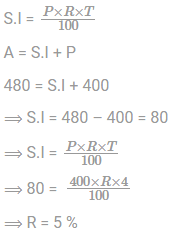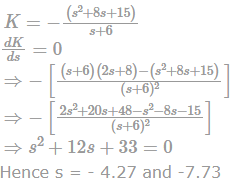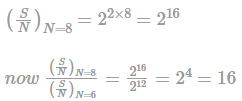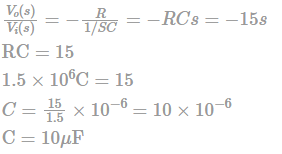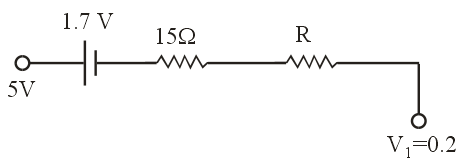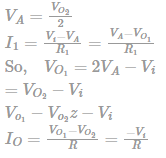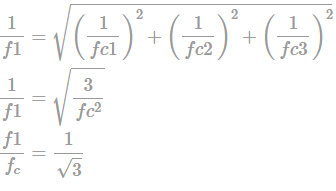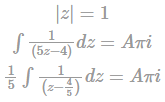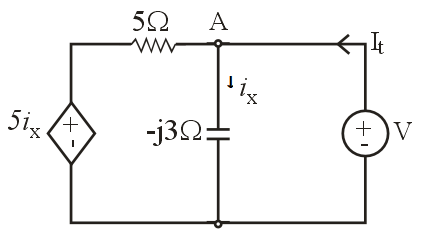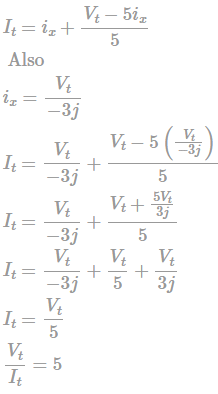Practice Test: Electronics Engineering (ECE)- 14 - Electronics and Communication Engineering (ECE) MCQ
30 Questions MCQ Test GATE ECE (Electronics) Mock Test Series 2025 - Practice Test: Electronics Engineering (ECE)- 14
A invest 1/3 part of the capital for 1/6 of the time, B invest 1/4 part of the capital for 1/2 of the time and C invest rest of the capital for rest of the time. Out of a profit of Rs. 23000, B’s share is?
Pipe A can fill a tank three times as fast as pipe B. If together two pipes can fill the tank in 48 min, the slower pipe alone will be able to fill the tank in:
| 1 Crore+ students have signed up on EduRev. Have you? Download the App |
In the following question, out of the four alternatives, select the word opposite in meaning to the given word.
Gratuitous
Find the area bounded between parabola and the line y2 = x,y = 2.
The bar graph shows the number of employees working under the six different Departments (A, B, C, D, E, F) of a certain company. Study the diagram and answer the following questions.
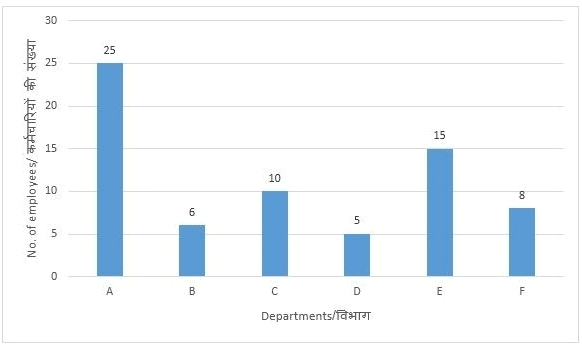
If departments F and D are merged to create a new department G, then which department will have the least number of employees?
In the following question, a sentence is given with a blank to be filled in with an appropriate word. Select the correct alternative out of the four and indicate it by selecting the appropriate option.
Confusion prevails in madrasas in Uttar Pradesh over the distribution of free NCERT textbooks as the academic session ____________ from August.
A sum of Rs.400 amounts to Rs.480 in 4 years. What will it amount to if the rate of interest is increased by 2 % for the same time?
The question below consists of a set of labelled sentences. These sentences, when properly sequenced form a coherent paragraph. Select the most logical order of sentences from among the options.
P: The Information and Broadcasting Ministry plans to conduct an independent study to gauge the impact of government advertisements on people.
Q: The advertisements are carried on various platforms, including print and visual media.
R: The Directorate of Advertising and Visual Publicity (DAVP) is the nodal agency of the government for advertising on behalf of the various ministries.
S: The initiative comes ahead of the Lok Sabha election in 2019 for which the government is expected to reach out to the people and highlight the works done by it in the past 4 years.
In the following question, some part of the sentence may have errors. Find out which part of the sentence has an error and select the appropriate option. If the sentence is free from error, select 'No error'.
The gold foil used liberal (1)/ in Thanjavur paintings serves (2)/ many objectives that makes the painting more attractive. (3)/ No error
A, B and C can do a job in 6 days, 12 days and 15 days respectively. C works till 1/8 of the work is completed and then leaves. Rest of the work is done by A and B together. Time taken to finish the remaining work by A & B together is how much?
Given a network with values of components depicted in the figure.
Find the sum of current through 5Ω and 4Ω resistor.
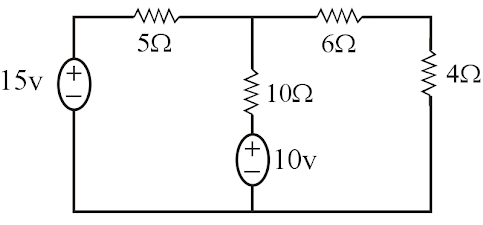
The number of possible distinct Boolean expression of 3 variables will be ___________.
Given the following system
T{X[n]} = X[n] + 3u[n+1]
Where u[x] represents unit step functions-
Which of the following is a correct representation of the system?
Consider the following sentences regarding a constant signal.
1) A constant signal is a periodic signal because it has no fundamental period.
2) A constant signal is an anti periodic signal because it never repeats itself.
List-1 (pole location) with list-2(shown constant amplitude with impulse response).
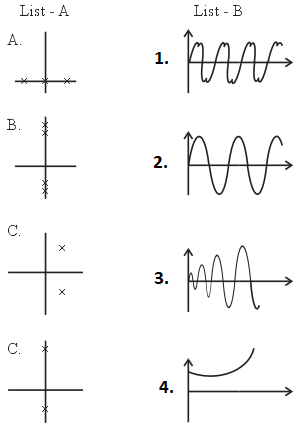
Select the correct answer using the codes given below.
In the root locus for open loop transfer function is ![]() the ‘break away/in points are located at
the ‘break away/in points are located at
In a PCM system, if the code word length is increased from 6 to 8 bits, the signal to quantization noise ratio improves by the factor
The op-amp configuration shown below has following transfer function ![]() The feedback resistance used has 1.5 MΩ , the value of capacitance will be ___________ µf.
The feedback resistance used has 1.5 MΩ , the value of capacitance will be ___________ µf.
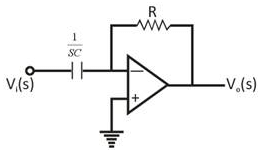
A semiconductor sample at room temperature has intrinsic concentration of 2.5 X 1017 /m3. After doping what will be the minority carrier concentration if the majority carrier concentration is given as 5.5 X 1021 /m3.
An LED is connected as shown in figure. It should glow when V1 is at logic ‘0’ state (0.2V). Calculate R( in Ω). (Assume in active state current as 15 mA)
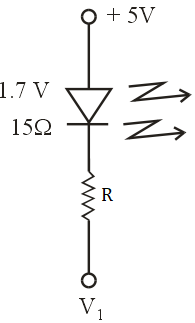
For an ideal p-channel MOSFET, μp = 300cm2/v-s, W = 15μm, L = 1.5μm, tox = 300A, Vt = -0.7V. If the transistor is non-saturation region at VSD = 0.5V, then what is the Transconductance gm?
In the circuit shown below express the current I0 in terms of Vi
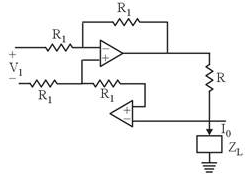
From the circuit given below, find out the operating region of the transistors T1 and T2
(VTH = -0.4)

In the circuit shown below, assume that the voltage drop across a forward biased diode is 0.7 V. The thermal voltage V1 = kT/q = 25 mV. The small signal input Vi = Vp cos(ωt) where Vp = 100 mV.
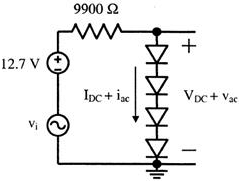
The bias current IDC through the diodes is
A communication channel having AWGN characteristics is operating in such a way that SNR >> 1. The bandwidth of signal being transmitted is B and capacity C1. Determine the capacity of channel if a signal with half the bandwidth is transmitted through the same channel with same quality.
A three stage amplifier with identical stages with lower cut-off frequency per stage 'f1' is given overall negative feedback. Depending on the overall gain, the system may oscillate at a low frequency fc given by
Consider the differential equation 3yn(x) + 27y(x) = 0 with initial conditions y(0) = 0 and y'(0) = 2000. The value of y at x = 1 is
Let z be a complex variable. For a counter-clockwise integration around a unit circle C, centred at origin, ![]() the value of A is
the value of A is
In the given circuit, the equivalent impedance of the circuit between terminals A-B is
The ROCs of different impulse responses are shown below. Which of the following impulse responses are stable?
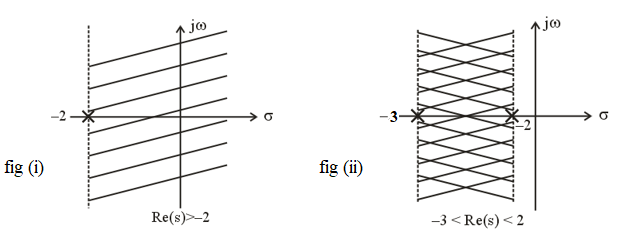
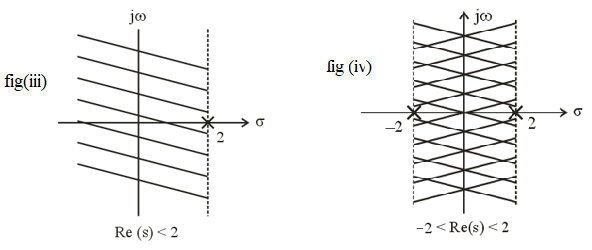
|
25 docs|263 tests
|
|
25 docs|263 tests
|




